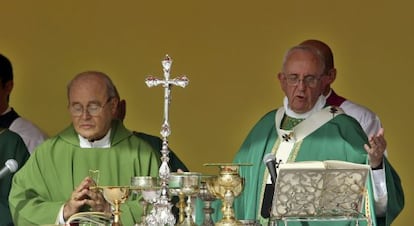Cuban police prevent Pope Francis from meeting with dissidents
Pontiff makes no mention of political and social situations on visit to communist island


Pope Francis celebrated his first Mass in Havana on Sunday without mentioning the social or political situation in the country, or even acknowledging Cuban dissidents or the recent negotiations between Havana and the United States to re-establish diplomatic relations.
Attended by Cuban President Raúl Castro and Argentinean President Cristina Fernández de Kirchner, the Mass was celebrated at Havana’s Revolutionary Square.
After the ceremony, the pope held a 40-minute meeting with former Cuban President Fidel Castro
After the ceremony, the Argentinean-born Jorge Mario Bergoglio held a 40-minute meeting with former Cuban President Fidel Castro.
The pope arrived on Saturday for a four-day visit to Cuba and will travel to the United States on Tuesday.
Hours before the Mass, Cuban police detained dozens of dissidents in an attempt to try to keep them from meeting with the pope.
“The state security arrested me and 25 others to prevent us from explaining our positions,” said Berta Soler, leader of the Ladies in White dissident movement. “They arrested me twice – on Saturday afternoon so I couldn’t go to the Papal Nuncio [where the pope is staying] and Sunday in the morning to keep me from going to church,”
Vatican spokesman Federico Lombardi acknowledged on Sunday that the pope had not tried to hold a formal meeting with dissidents but Catholic leaders in Cuba tried to organize a short encounter with some opposition leaders but police blocked both attempts.
During the pope’s Homily on Sunday, he asked followers to be willing to serve other people and not ideologies.
“The importance of the people, of a nation, and the importance of a person is always based on how to serve the fragility of his brothers,” the pope said, “Ideology can never be considered a service because it only serves people and doesn’t project ideas,” he said.
Following the Mass, Havana Archbishop Jaime Lucas Ortega praised the pope’s efforts in mediating secret talks between Cuba and the United States aimed at establishing full bilateral relations following 54 years. Both countries opened embassies in each others’ respective capitals earlier this year.
Ortega also thanked the pope for his concern in wanting to settle the internal disputes “between Cubans who live in the country or abroad.”
Ortega also thanked the pope for his concern in wanting to settle the internal disputes “between Cubans who live in the country or abroad”
It wasn’t the first time that a pope had avoided meeting with Cuba’s dissidents. In prior official visits, both Pope John Paul II and Pope Benedict XVI also failed to hold meetings with the Cuban opposition while they were in Havana.
Following the service, Pope Francis visited with Fidel Castro for about 40 minutes. According to Lombardi, the Vatican spokesman, the two exchanged books while the former Cuban leader asked the pontiff about global issues.
Castro was accompanied by his wife, sons and grandchildren.
English version by Martin Delfín.
Tu suscripción se está usando en otro dispositivo
¿Quieres añadir otro usuario a tu suscripción?
Si continúas leyendo en este dispositivo, no se podrá leer en el otro.
FlechaTu suscripción se está usando en otro dispositivo y solo puedes acceder a EL PAÍS desde un dispositivo a la vez.
Si quieres compartir tu cuenta, cambia tu suscripción a la modalidad Premium, así podrás añadir otro usuario. Cada uno accederá con su propia cuenta de email, lo que os permitirá personalizar vuestra experiencia en EL PAÍS.
¿Tienes una suscripción de empresa? Accede aquí para contratar más cuentas.
En el caso de no saber quién está usando tu cuenta, te recomendamos cambiar tu contraseña aquí.
Si decides continuar compartiendo tu cuenta, este mensaje se mostrará en tu dispositivo y en el de la otra persona que está usando tu cuenta de forma indefinida, afectando a tu experiencia de lectura. Puedes consultar aquí los términos y condiciones de la suscripción digital.








































